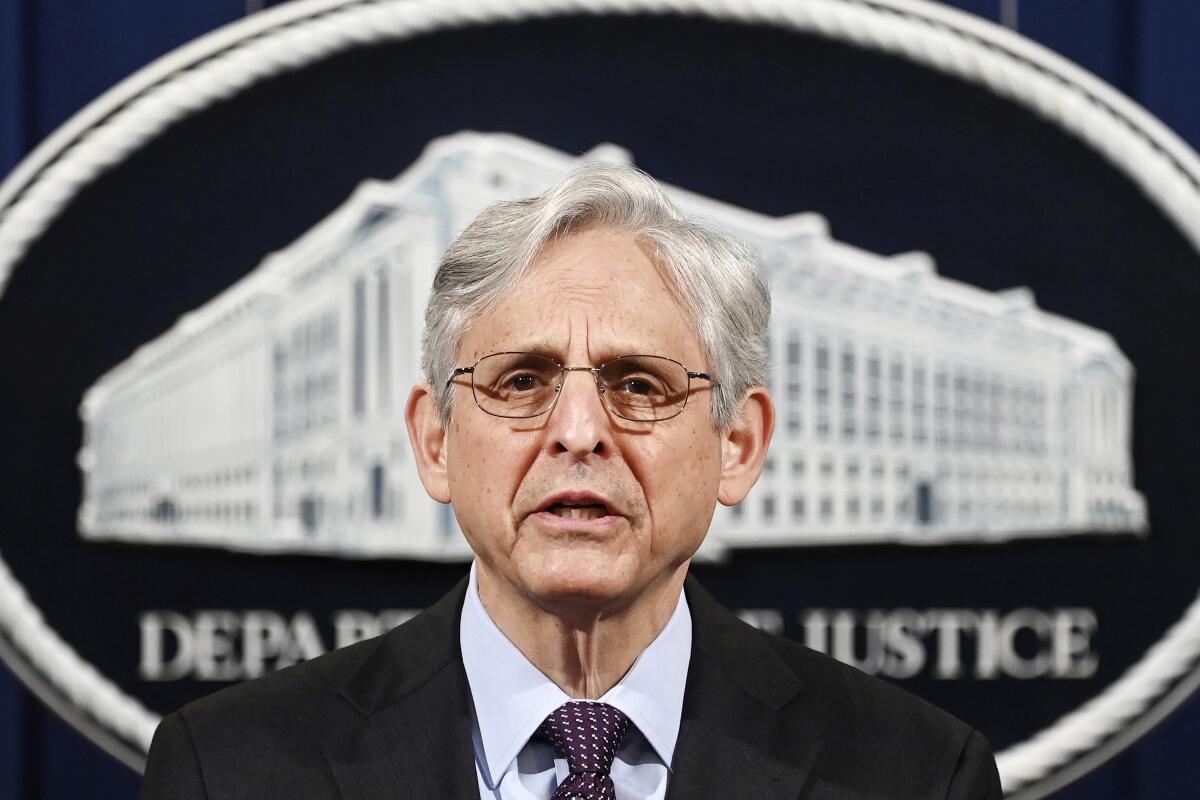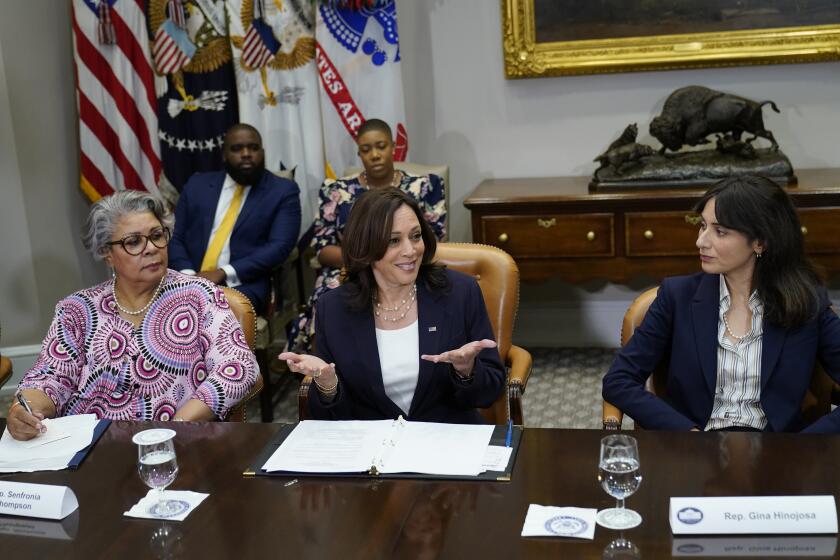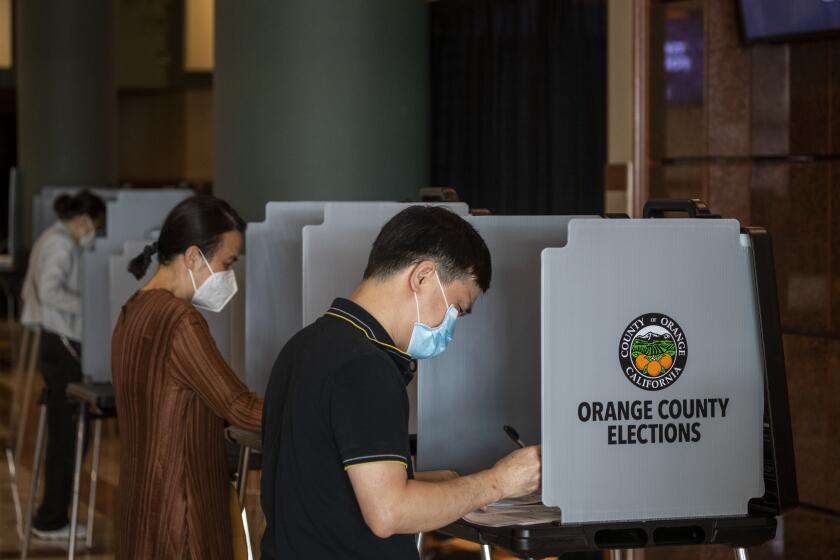Justice Department will challenge Georgia’s restrictive new voting law

- Share via
WASHINGTON — In what is expected to be the first salvo in the federal government’s legal assault on a slew of state efforts that restrict voting access, the Justice Department filed a lawsuit Friday challenging a new Georgia law on the grounds it discriminates against Black voters.
The 46-page federal lawsuit targets Georgia’s Election Integrity Act, which was passed by the Republican-controlled state Legislature and signed into law by GOP Gov. Brian Kemp in March, in the wake of former President Trump’s falsehood-filled campaign claiming widespread fraud in an election he lost.
Atty. Gen. Merrick Garland and top Justice Department officials allege the Georgia law harms voters of color by restricting the distribution of absentee ballots, shortening the window to obtain such ballots and limiting the use of ballot drop boxes.
The suit also challenges a ban on civic groups from passing out food and water to voters in line. The Justice Department is asking a federal judge to prevent Georgia from enforcing those provisions because it alleges they violate the federal Voting Rights Act’s prohibition on practices or procedures that discriminate on the basis of race.
“Recent changes to Georgia’s election laws were enacted with a purpose of denying or abridging the right of Black Georgians to vote on account of their race or color,” Garland said. “This lawsuit is the first of many we are taking to ensure that all eligible voters can cast a vote, that all lawful votes are counted and that every voter has access to accurate information.”
Vice President Harris is leading the administration’s push on voting rights. As prospects dim in Congress, she’s trying to rally voters and activists.
Kemp criticized the suit on Twitter, saying it resulted from lies being promoted by President Biden and Stacey Abrams, a former Democratic gubernatorial candidate in Georgia who worked to boost Black voter turnout in 2020. Biden in March referred to the measure as “Jim Crow in the 21st century” and “an atrocity.”
“They are weaponizing the U.S. Department of Justice to carry out their far-left agenda that undermines election integrity and empowers federal government overreach in our democracy,” Kemp alleged on Twitter.
Brad Raffensperger, Georgia’s Republican Secretary of State who drew praise on the left for standing up to Trump’s assault on the election’s integrity and was attacked bythe president at the time, also assailed the Justice Department effort.
Raffensperger has defended the 2020 election results, and he and other state and federal elections officials maintain there was no evidence that fraud played any role in tilting the election in Biden’s favor, but both he and Kemp have maintained that the new law safeguards voting integrity.
In a statement on Twitter, he also singled out Abrams, who is Black, for criticism: “The Biden Administration continues to do the bidding of Stacey Abrams and spreads more lies about Georgia’s election law,” he wrote.
“It is no surprise that they would operationalize their lies with the full force of the federal government,” Raffensperger added. “I look forward to meeting them, and beating them, in court.”
The court has freed Texas and other Southern states to add voting restrictions, and has given the GOP an edge in the battle to control Congress.
Legal experts said the Justice Department suit and legal actions brought by advocacy groups face long odds in court. That is because the Justice Department is alleging intentional racial discrimination under the Voting Rights Act, a claim that is often difficult to win.
“Some people who act in racist ways don’t explicitly say so,” said Rick Hasen, an election law expert and law professor at the UC Irvine School of Law. “The courts have been somewhat skeptical of such discrimination claims.”
Anthony Michael Kreis, a law professor at Georgia State University College of Law, said the Justice Department also faces “an uphill battle” because the courts have become more conservative in recent years, especially after Trump succeeded in appointing 200 jurists to the federal bench. Such judges, Kreis added, “are not as hostile to voting suppressive measures.”
The Supreme Court under Chief Justice John G. Roberts Jr. has also given wide latitude to state lawmakers to set election rules.
The Georgia law was passed in the wake of the state’s starring role in November’s election drama and its aftermath. In a shock to Georgia Republicans, Biden became the first Democrat since 1992 to win the state, by about 12,000 votes. Democrats, led by Abrams, campaigned aggressively in Georgia, which has been diversifying and undergoing demographic changes that favor their party.
Democrats are set to consider two voting-rights bills: the sweeping For the People Act and the narrower John Lewis Voting Rights Act.
In January, in another rebuke to state Republicans, two Democrats were elected to the U.S. Senate, giving their party control of that chamber of Congress. Republicans, in part, blamed the losses on local and state elections officials who sought to make it easier for residents to cast ballots — by allowing them to use drop boxes and expanding voting by mail — in response to the COVID-19 pandemic.
On March 25, under pressure from Trump supporters who believed his false claims, Republicans in the state Legislature passed a law they said would better secure elections.
Among its more contentions provisions were those that enhanced voter ID requirements, allowed the state take over of local elections, banned officials from sending out absentee ballot applications and reduced the number of ballot drop boxes.
The law drew widespread protests and led Major League Baseball to move its All Star Game next month from Atlanta to Denver. The statute was among the first restrictive voting laws to be passed by GOP-controlled state legislatures. So far, at least 14 states have passed such measures.
In a policy speech on June 11, Garland pledged the Justice Department would seek to challenge such laws if they discriminated against voters of color. “We are scrutinizing new laws that seek to curb voter access, and where we see violations of federal law, we will not hesitate to act,” Garland said.
On Friday, Garland and his top civil rights prosecutor, Kristen Clarke, argued that the Georgia law, known as Senate Bill 202, did exactly that.
Clarke said the law was passed with a “discriminatory purpose” and through “a rushed process that departed from normal practice and procedure.”
“Laws adopted with racially motivated purpose, like Georgia’s Senate Bill 202, simply have no place in democracy today,” she said. “The provisions we are challenging reduce access to absentee voting at each step of the process, and push more Black voters to in-person voting, where they will be more likely than white voters to confront long lines.”
The law, she added, was not produced in a vacuum and was only enacted following “successful absentee voting in the 2020 election cycle, especially among Black voters.”
More to Read
Get the L.A. Times Politics newsletter
Deeply reported insights into legislation, politics and policy from Sacramento, Washington and beyond. In your inbox three times per week.
You may occasionally receive promotional content from the Los Angeles Times.















